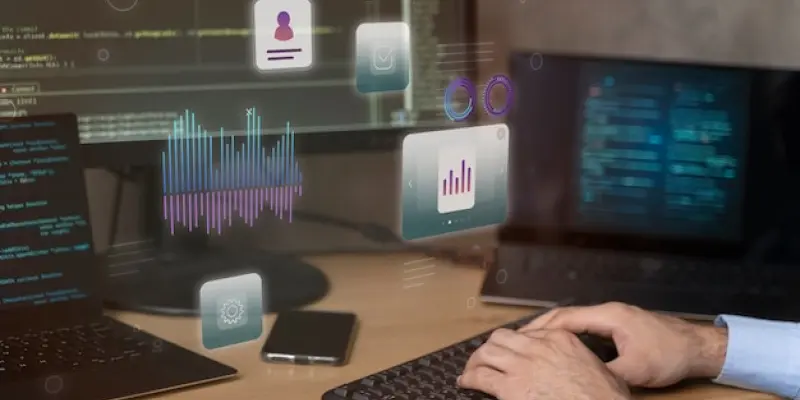Artificial intelligence has rapidly become an integral force in cybersecurity and software engineering, reshaping both fields in profound ways. As cyber threats grow more sophisticated, AI emerges as a critical tool in the defense arsenal, offering advanced solutions for real-time threat detection and mitigation. Meanwhile, software engineering is experiencing a transformation with AI-driven automation that enhances productivity and efficiency, enabling the development of more resilient and intelligent systems. The convergence of AI, cybersecurity, and software engineering is influencing how organizations protect their digital assets and innovate software solutions, creating a landscape where collaboration across these domains drives technological advancement.
AI’s Role in Enhancing Cybersecurity
AI has become a cornerstone of modern cybersecurity strategies, equipping organizations with the capability to detect and respond to threats swiftly and effectively. Drawing upon machine learning models, AI systems can analyze vast amounts of data to identify anomalies and predict potential breaches based on past patterns. This ability to learn and adapt enhances security measures, allowing them to stay ahead of increasingly complex cyber threats, such as those targeting financial infrastructure and IoT networks. Moreover, AI facilitates the deployment of automated responses to threats, minimizing human intervention and accelerating reaction times, which is crucial in an era of lightning-fast cyberattacks.
One of the most significant contributions of AI to cybersecurity is its ability to expertly manage large-scale data analysis, fostering the development of intelligent threat prevention strategies. By ingesting and processing high volumes of data from diverse sources, AI systems can pinpoint unusual patterns that might indicate a potential security breach. This proactive approach allows organizations to strengthen their defenses and mitigate risks before an attack occurs. Furthermore, AI-powered solutions are instrumental in combating dual-use adversarial AI threats, enabling experts to devise counterstrategies to safeguard their digital environments. As security concerns evolve, AI remains pivotal in equipping organizations with innovative tools for sustaining robust defenses.
Transformative Impact on Software Engineering
AI’s influence isn’t limited to cybersecurity; it also plays a pivotal role in transforming the landscape of software engineering. From automating repetitive coding tasks to optimizing system architecture, AI-powered tools enhance software development processes by streamlining workflows and increasing efficiency. The integration of AI allows for the construction of more sophisticated and intelligent systems, making software systems more adaptive to real-world pressures. This evolution of software engineering aids enterprises in solving complex challenges, including those posed by scalable architectures, ensuring high availability and exceptional performance even in intricate digital ecosystems. Another area where AI is significantly impacting software engineering is through intelligent frameworks and development environments that foster creativity and innovation. By leveraging AI capabilities, software engineers can optimize design processes, leading to the creation of forward-thinking applications that effectively address user needs. This symbiosis between AI and software engineering catalyzes the development of cutting-edge systems, providing engineers with the tools to tackle architectural complexities while also maintaining stringent security protocols. As AI continues to permeate the software engineering domain, its transformative impact is evident in how digital infrastructures are constructed and maintained, paving the way for future advancements.
Shaping the Future of Technology
As AI becomes deeply ingrained in both cybersecurity and software engineering, professionals are navigating emerging challenges such as generative AI and potential quantum computing threats. The expertise in these areas, exemplified by individuals like Sriharsha Daram, underscores the importance of fostering secure and ethically designed systems. Mentorship initiatives focused on secure coding, system design, and ethical AI practices play a vital role in nurturing the next generation of technology leaders. This commitment ensures that the development of intelligent technologies remains aligned with ethical considerations and resilience against evolving threats in a hyperconnected world.
AI’s fusion with cybersecurity and software engineering has created an ecosystem where collaborations between experts drive the evolution of resilient digital systems. As the technological landscape progresses, recognizing AI’s transformative role in these apposite fields becomes increasingly important for creating future-proof solutions. Through its diverse applications and implications, AI not only shapes current technological methodologies but also sets the foundation for further explorations in innovation. As more enterprises adopt AI-driven solutions, the potential for revolutionizing both cybersecurity and software engineering is vast, paving the way for a secure and intelligent technological future.
Looking Ahead: Next Steps
Artificial intelligence has swiftly become a pivotal force in the domains of cybersecurity and software engineering, dramatically reshaping these fields. As cyber threats become more sophisticated, AI has emerged as a crucial component in the defense strategy, providing advanced methods for real-time threat identification and response. In parallel, software engineering is undergoing a significant transformation spurred by AI-driven automation, boosting productivity and efficiency. This enables the creation of more robust and intelligent systems. The intersection of AI, cybersecurity, and software engineering is reshaping the way organizations defend their digital assets and innovate in software development. The blend of these technologies fosters a collaborative environment, driving technological innovation forward. This convergence encourages experts from different disciplines to work together, ensuring that advancements in security and software design stay ahead of the challenges, and allowing a new era of smart, secure, and efficient systems to emerge.

